Organisational Behaviour Report: Leadership and Motivation Theories
VerifiedAdded on 2020/10/22
|17
|5018
|229
Report
AI Summary
This report delves into the multifaceted aspects of organisational behaviour, examining the impact of power, culture, and politics on individual and team dynamics within a business setting. It uses Handy's cultural typology to analyze the influence of power, task, person, and role cultures on employee performance, with a specific focus on David Michael & Co. The report further evaluates content and process theories of motivation, including Maslow's Hierarchy of Needs, to understand how to enhance employee engagement and productivity. It also addresses the characteristics of effective and ineffective teams and applies organisational behaviour concepts and philosophies to practical business situations, offering insights into leadership, team building, and creating a positive work environment. The report emphasizes the importance of understanding employee needs and implementing strategies that foster a supportive and motivating workplace culture.
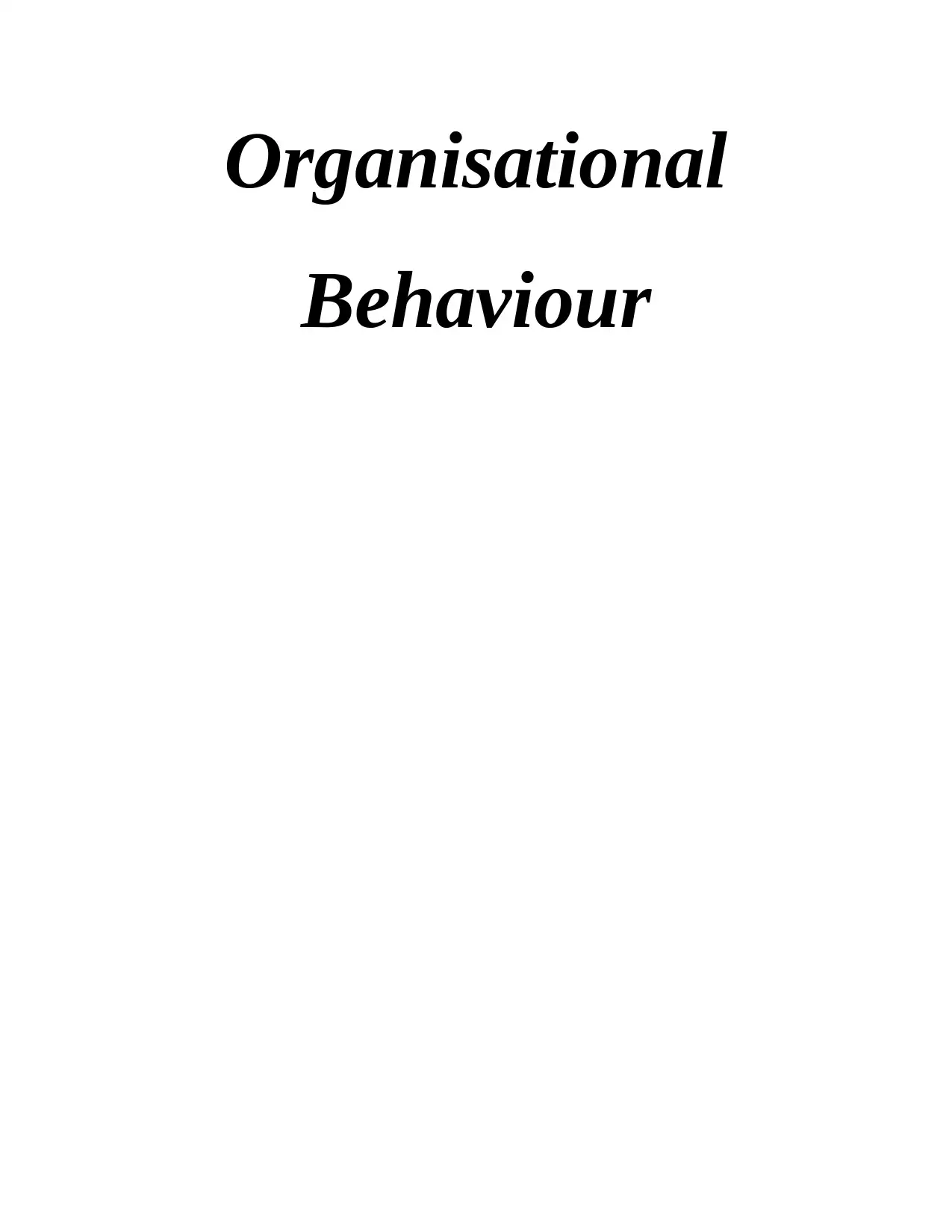
Organisational
Behaviour
Behaviour
Paraphrase This Document
Need a fresh take? Get an instant paraphrase of this document with our AI Paraphraser
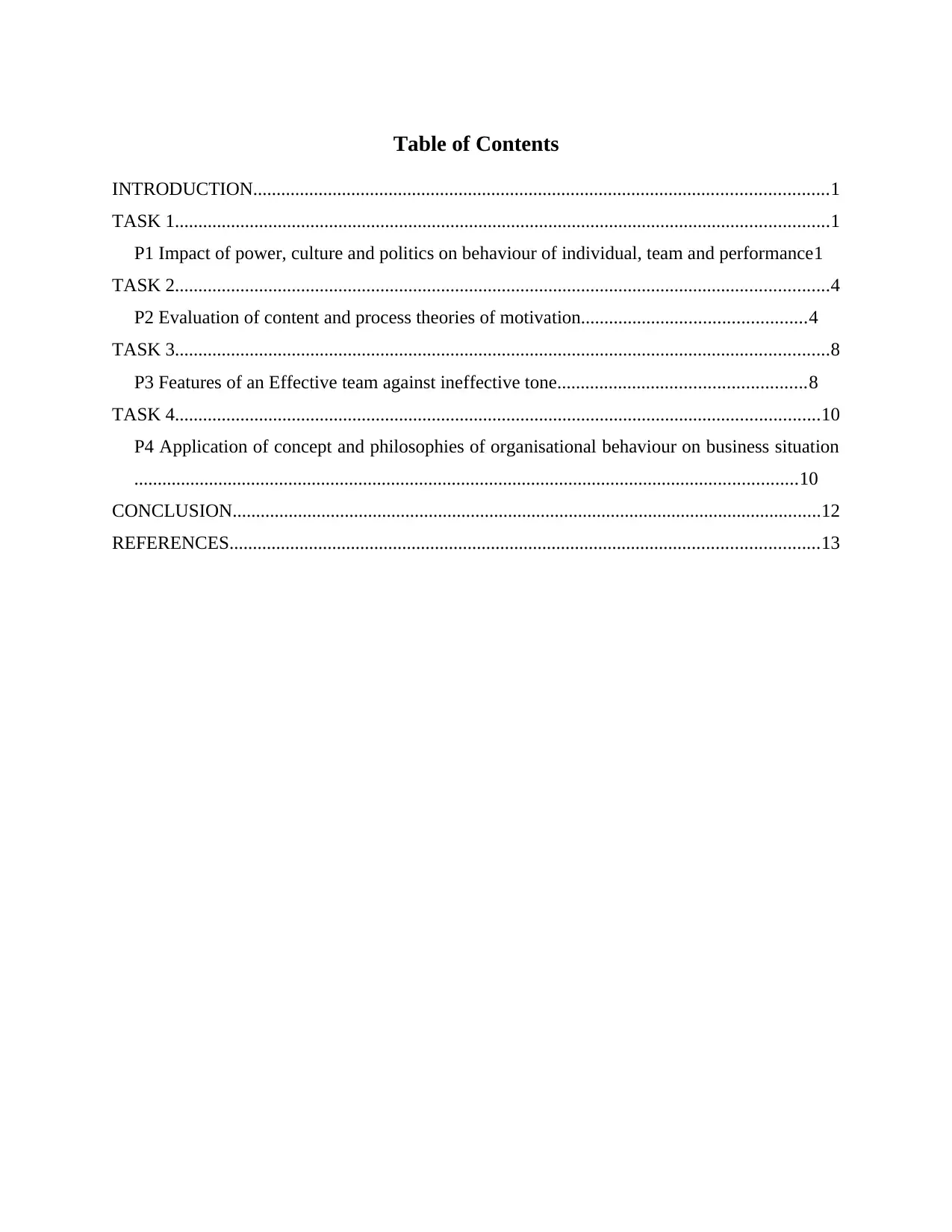
Table of Contents
INTRODUCTION...........................................................................................................................1
TASK 1............................................................................................................................................1
P1 Impact of power, culture and politics on behaviour of individual, team and performance1
TASK 2............................................................................................................................................4
P2 Evaluation of content and process theories of motivation................................................4
TASK 3............................................................................................................................................8
P3 Features of an Effective team against ineffective tone.....................................................8
TASK 4..........................................................................................................................................10
P4 Application of concept and philosophies of organisational behaviour on business situation
..............................................................................................................................................10
CONCLUSION..............................................................................................................................12
REFERENCES..............................................................................................................................13
INTRODUCTION...........................................................................................................................1
TASK 1............................................................................................................................................1
P1 Impact of power, culture and politics on behaviour of individual, team and performance1
TASK 2............................................................................................................................................4
P2 Evaluation of content and process theories of motivation................................................4
TASK 3............................................................................................................................................8
P3 Features of an Effective team against ineffective tone.....................................................8
TASK 4..........................................................................................................................................10
P4 Application of concept and philosophies of organisational behaviour on business situation
..............................................................................................................................................10
CONCLUSION..............................................................................................................................12
REFERENCES..............................................................................................................................13

⊘ This is a preview!⊘
Do you want full access?
Subscribe today to unlock all pages.

Trusted by 1+ million students worldwide
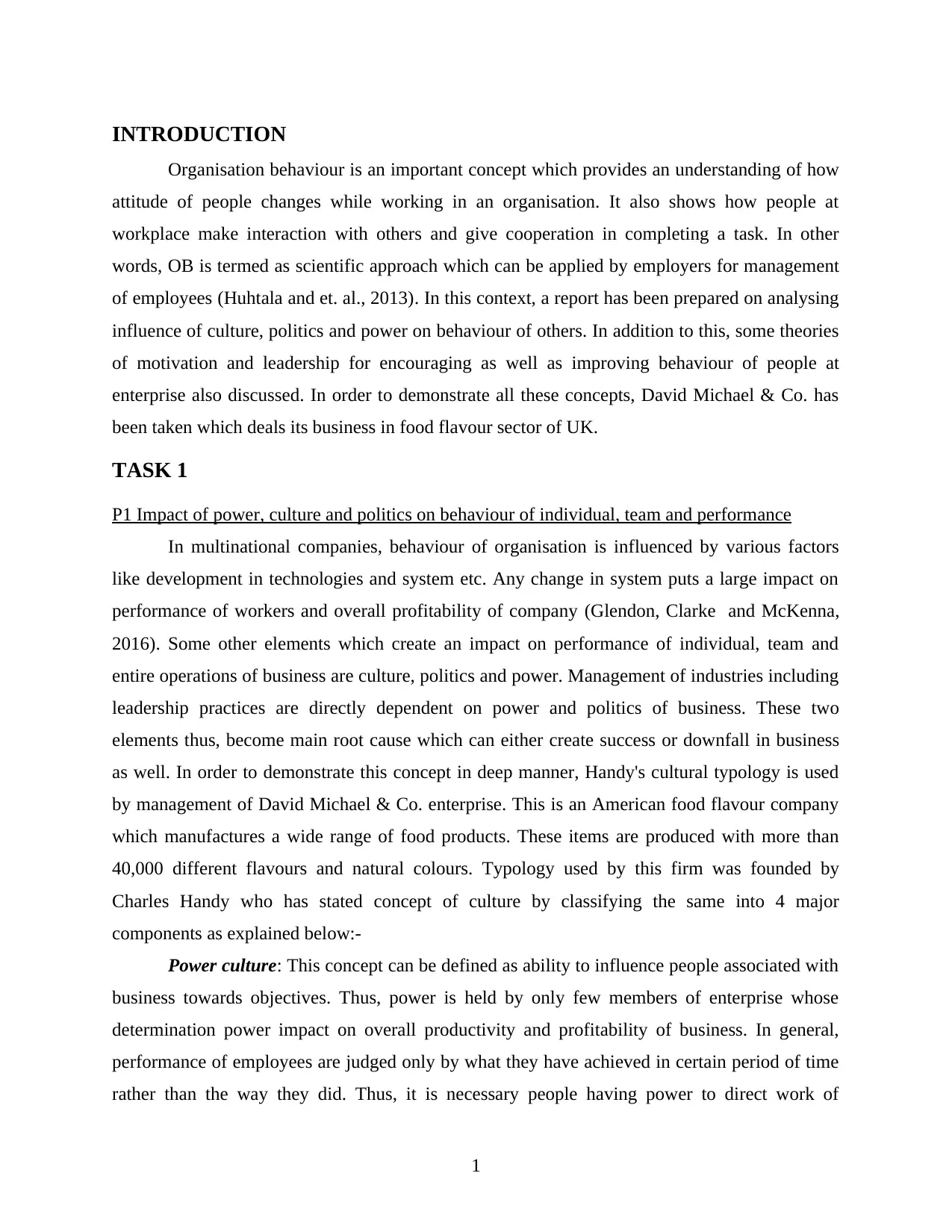
INTRODUCTION
Organisation behaviour is an important concept which provides an understanding of how
attitude of people changes while working in an organisation. It also shows how people at
workplace make interaction with others and give cooperation in completing a task. In other
words, OB is termed as scientific approach which can be applied by employers for management
of employees (Huhtala and et. al., 2013). In this context, a report has been prepared on analysing
influence of culture, politics and power on behaviour of others. In addition to this, some theories
of motivation and leadership for encouraging as well as improving behaviour of people at
enterprise also discussed. In order to demonstrate all these concepts, David Michael & Co. has
been taken which deals its business in food flavour sector of UK.
TASK 1
P1 Impact of power, culture and politics on behaviour of individual, team and performance
In multinational companies, behaviour of organisation is influenced by various factors
like development in technologies and system etc. Any change in system puts a large impact on
performance of workers and overall profitability of company (Glendon, Clarke and McKenna,
2016). Some other elements which create an impact on performance of individual, team and
entire operations of business are culture, politics and power. Management of industries including
leadership practices are directly dependent on power and politics of business. These two
elements thus, become main root cause which can either create success or downfall in business
as well. In order to demonstrate this concept in deep manner, Handy's cultural typology is used
by management of David Michael & Co. enterprise. This is an American food flavour company
which manufactures a wide range of food products. These items are produced with more than
40,000 different flavours and natural colours. Typology used by this firm was founded by
Charles Handy who has stated concept of culture by classifying the same into 4 major
components as explained below:-
Power culture: This concept can be defined as ability to influence people associated with
business towards objectives. Thus, power is held by only few members of enterprise whose
determination power impact on overall productivity and profitability of business. In general,
performance of employees are judged only by what they have achieved in certain period of time
rather than the way they did. Thus, it is necessary people having power to direct work of
1
Organisation behaviour is an important concept which provides an understanding of how
attitude of people changes while working in an organisation. It also shows how people at
workplace make interaction with others and give cooperation in completing a task. In other
words, OB is termed as scientific approach which can be applied by employers for management
of employees (Huhtala and et. al., 2013). In this context, a report has been prepared on analysing
influence of culture, politics and power on behaviour of others. In addition to this, some theories
of motivation and leadership for encouraging as well as improving behaviour of people at
enterprise also discussed. In order to demonstrate all these concepts, David Michael & Co. has
been taken which deals its business in food flavour sector of UK.
TASK 1
P1 Impact of power, culture and politics on behaviour of individual, team and performance
In multinational companies, behaviour of organisation is influenced by various factors
like development in technologies and system etc. Any change in system puts a large impact on
performance of workers and overall profitability of company (Glendon, Clarke and McKenna,
2016). Some other elements which create an impact on performance of individual, team and
entire operations of business are culture, politics and power. Management of industries including
leadership practices are directly dependent on power and politics of business. These two
elements thus, become main root cause which can either create success or downfall in business
as well. In order to demonstrate this concept in deep manner, Handy's cultural typology is used
by management of David Michael & Co. enterprise. This is an American food flavour company
which manufactures a wide range of food products. These items are produced with more than
40,000 different flavours and natural colours. Typology used by this firm was founded by
Charles Handy who has stated concept of culture by classifying the same into 4 major
components as explained below:-
Power culture: This concept can be defined as ability to influence people associated with
business towards objectives. Thus, power is held by only few members of enterprise whose
determination power impact on overall productivity and profitability of business. In general,
performance of employees are judged only by what they have achieved in certain period of time
rather than the way they did. Thus, it is necessary people having power to direct work of
1
Paraphrase This Document
Need a fresh take? Get an instant paraphrase of this document with our AI Paraphraser
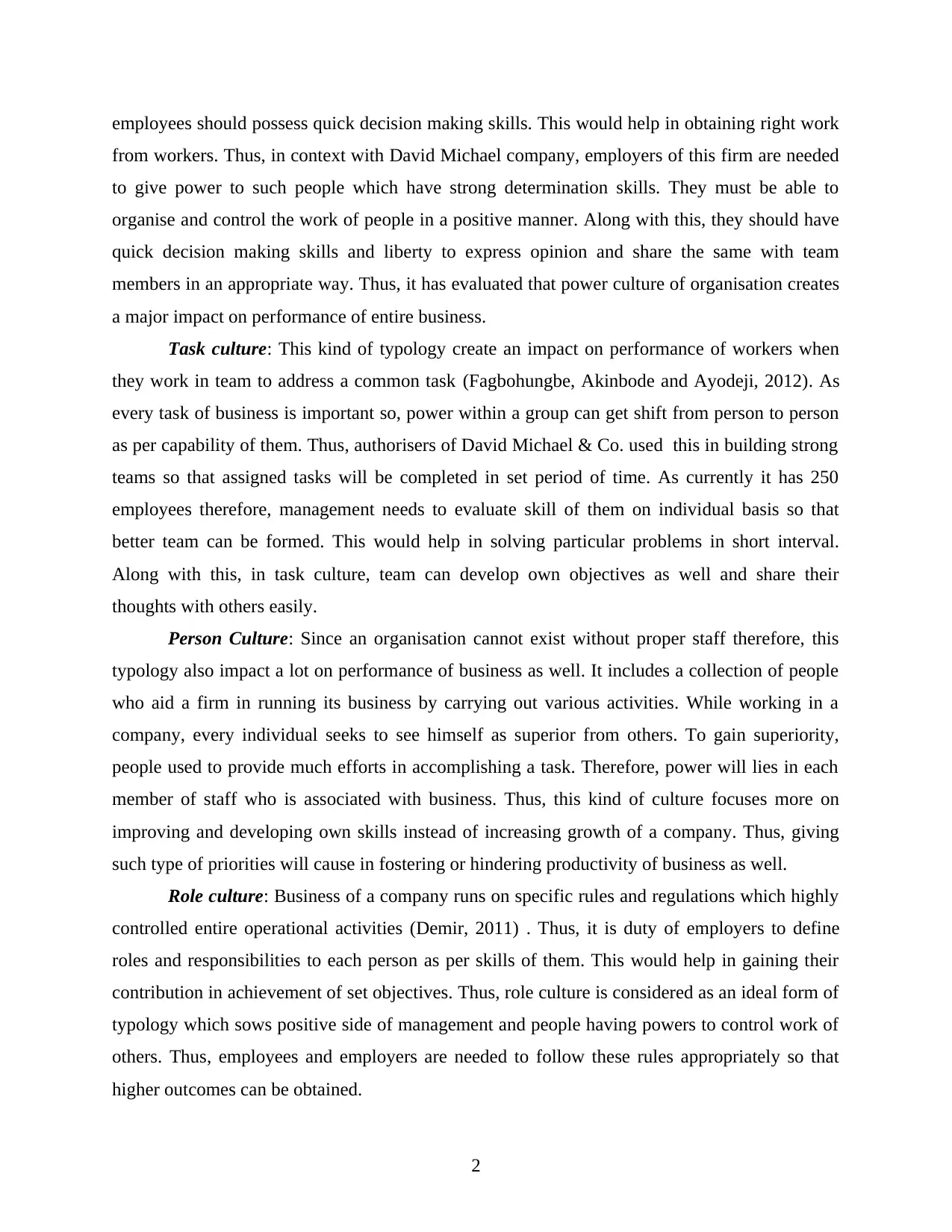
employees should possess quick decision making skills. This would help in obtaining right work
from workers. Thus, in context with David Michael company, employers of this firm are needed
to give power to such people which have strong determination skills. They must be able to
organise and control the work of people in a positive manner. Along with this, they should have
quick decision making skills and liberty to express opinion and share the same with team
members in an appropriate way. Thus, it has evaluated that power culture of organisation creates
a major impact on performance of entire business.
Task culture: This kind of typology create an impact on performance of workers when
they work in team to address a common task (Fagbohungbe, Akinbode and Ayodeji, 2012). As
every task of business is important so, power within a group can get shift from person to person
as per capability of them. Thus, authorisers of David Michael & Co. used this in building strong
teams so that assigned tasks will be completed in set period of time. As currently it has 250
employees therefore, management needs to evaluate skill of them on individual basis so that
better team can be formed. This would help in solving particular problems in short interval.
Along with this, in task culture, team can develop own objectives as well and share their
thoughts with others easily.
Person Culture: Since an organisation cannot exist without proper staff therefore, this
typology also impact a lot on performance of business as well. It includes a collection of people
who aid a firm in running its business by carrying out various activities. While working in a
company, every individual seeks to see himself as superior from others. To gain superiority,
people used to provide much efforts in accomplishing a task. Therefore, power will lies in each
member of staff who is associated with business. Thus, this kind of culture focuses more on
improving and developing own skills instead of increasing growth of a company. Thus, giving
such type of priorities will cause in fostering or hindering productivity of business as well.
Role culture: Business of a company runs on specific rules and regulations which highly
controlled entire operational activities (Demir, 2011) . Thus, it is duty of employers to define
roles and responsibilities to each person as per skills of them. This would help in gaining their
contribution in achievement of set objectives. Thus, role culture is considered as an ideal form of
typology which sows positive side of management and people having powers to control work of
others. Thus, employees and employers are needed to follow these rules appropriately so that
higher outcomes can be obtained.
2
from workers. Thus, in context with David Michael company, employers of this firm are needed
to give power to such people which have strong determination skills. They must be able to
organise and control the work of people in a positive manner. Along with this, they should have
quick decision making skills and liberty to express opinion and share the same with team
members in an appropriate way. Thus, it has evaluated that power culture of organisation creates
a major impact on performance of entire business.
Task culture: This kind of typology create an impact on performance of workers when
they work in team to address a common task (Fagbohungbe, Akinbode and Ayodeji, 2012). As
every task of business is important so, power within a group can get shift from person to person
as per capability of them. Thus, authorisers of David Michael & Co. used this in building strong
teams so that assigned tasks will be completed in set period of time. As currently it has 250
employees therefore, management needs to evaluate skill of them on individual basis so that
better team can be formed. This would help in solving particular problems in short interval.
Along with this, in task culture, team can develop own objectives as well and share their
thoughts with others easily.
Person Culture: Since an organisation cannot exist without proper staff therefore, this
typology also impact a lot on performance of business as well. It includes a collection of people
who aid a firm in running its business by carrying out various activities. While working in a
company, every individual seeks to see himself as superior from others. To gain superiority,
people used to provide much efforts in accomplishing a task. Therefore, power will lies in each
member of staff who is associated with business. Thus, this kind of culture focuses more on
improving and developing own skills instead of increasing growth of a company. Thus, giving
such type of priorities will cause in fostering or hindering productivity of business as well.
Role culture: Business of a company runs on specific rules and regulations which highly
controlled entire operational activities (Demir, 2011) . Thus, it is duty of employers to define
roles and responsibilities to each person as per skills of them. This would help in gaining their
contribution in achievement of set objectives. Thus, role culture is considered as an ideal form of
typology which sows positive side of management and people having powers to control work of
others. Thus, employees and employers are needed to follow these rules appropriately so that
higher outcomes can be obtained.
2
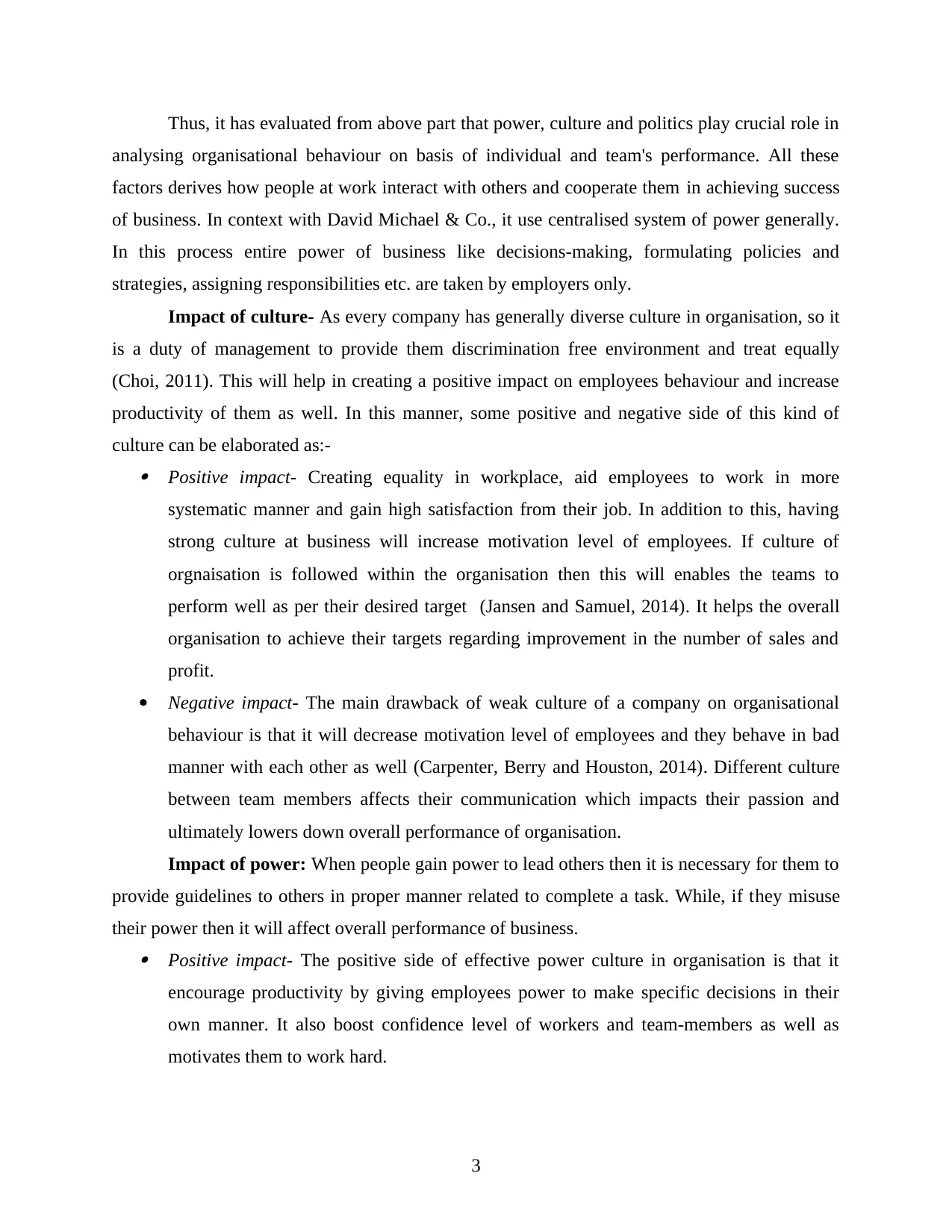
Thus, it has evaluated from above part that power, culture and politics play crucial role in
analysing organisational behaviour on basis of individual and team's performance. All these
factors derives how people at work interact with others and cooperate them in achieving success
of business. In context with David Michael & Co., it use centralised system of power generally.
In this process entire power of business like decisions-making, formulating policies and
strategies, assigning responsibilities etc. are taken by employers only.
Impact of culture- As every company has generally diverse culture in organisation, so it
is a duty of management to provide them discrimination free environment and treat equally
(Choi, 2011). This will help in creating a positive impact on employees behaviour and increase
productivity of them as well. In this manner, some positive and negative side of this kind of
culture can be elaborated as:- Positive impact- Creating equality in workplace, aid employees to work in more
systematic manner and gain high satisfaction from their job. In addition to this, having
strong culture at business will increase motivation level of employees. If culture of
orgnaisation is followed within the organisation then this will enables the teams to
perform well as per their desired target (Jansen and Samuel, 2014). It helps the overall
organisation to achieve their targets regarding improvement in the number of sales and
profit.
Negative impact- The main drawback of weak culture of a company on organisational
behaviour is that it will decrease motivation level of employees and they behave in bad
manner with each other as well (Carpenter, Berry and Houston, 2014). Different culture
between team members affects their communication which impacts their passion and
ultimately lowers down overall performance of organisation.
Impact of power: When people gain power to lead others then it is necessary for them to
provide guidelines to others in proper manner related to complete a task. While, if they misuse
their power then it will affect overall performance of business. Positive impact- The positive side of effective power culture in organisation is that it
encourage productivity by giving employees power to make specific decisions in their
own manner. It also boost confidence level of workers and team-members as well as
motivates them to work hard.
3
analysing organisational behaviour on basis of individual and team's performance. All these
factors derives how people at work interact with others and cooperate them in achieving success
of business. In context with David Michael & Co., it use centralised system of power generally.
In this process entire power of business like decisions-making, formulating policies and
strategies, assigning responsibilities etc. are taken by employers only.
Impact of culture- As every company has generally diverse culture in organisation, so it
is a duty of management to provide them discrimination free environment and treat equally
(Choi, 2011). This will help in creating a positive impact on employees behaviour and increase
productivity of them as well. In this manner, some positive and negative side of this kind of
culture can be elaborated as:- Positive impact- Creating equality in workplace, aid employees to work in more
systematic manner and gain high satisfaction from their job. In addition to this, having
strong culture at business will increase motivation level of employees. If culture of
orgnaisation is followed within the organisation then this will enables the teams to
perform well as per their desired target (Jansen and Samuel, 2014). It helps the overall
organisation to achieve their targets regarding improvement in the number of sales and
profit.
Negative impact- The main drawback of weak culture of a company on organisational
behaviour is that it will decrease motivation level of employees and they behave in bad
manner with each other as well (Carpenter, Berry and Houston, 2014). Different culture
between team members affects their communication which impacts their passion and
ultimately lowers down overall performance of organisation.
Impact of power: When people gain power to lead others then it is necessary for them to
provide guidelines to others in proper manner related to complete a task. While, if they misuse
their power then it will affect overall performance of business. Positive impact- The positive side of effective power culture in organisation is that it
encourage productivity by giving employees power to make specific decisions in their
own manner. It also boost confidence level of workers and team-members as well as
motivates them to work hard.
3
⊘ This is a preview!⊘
Do you want full access?
Subscribe today to unlock all pages.

Trusted by 1+ million students worldwide
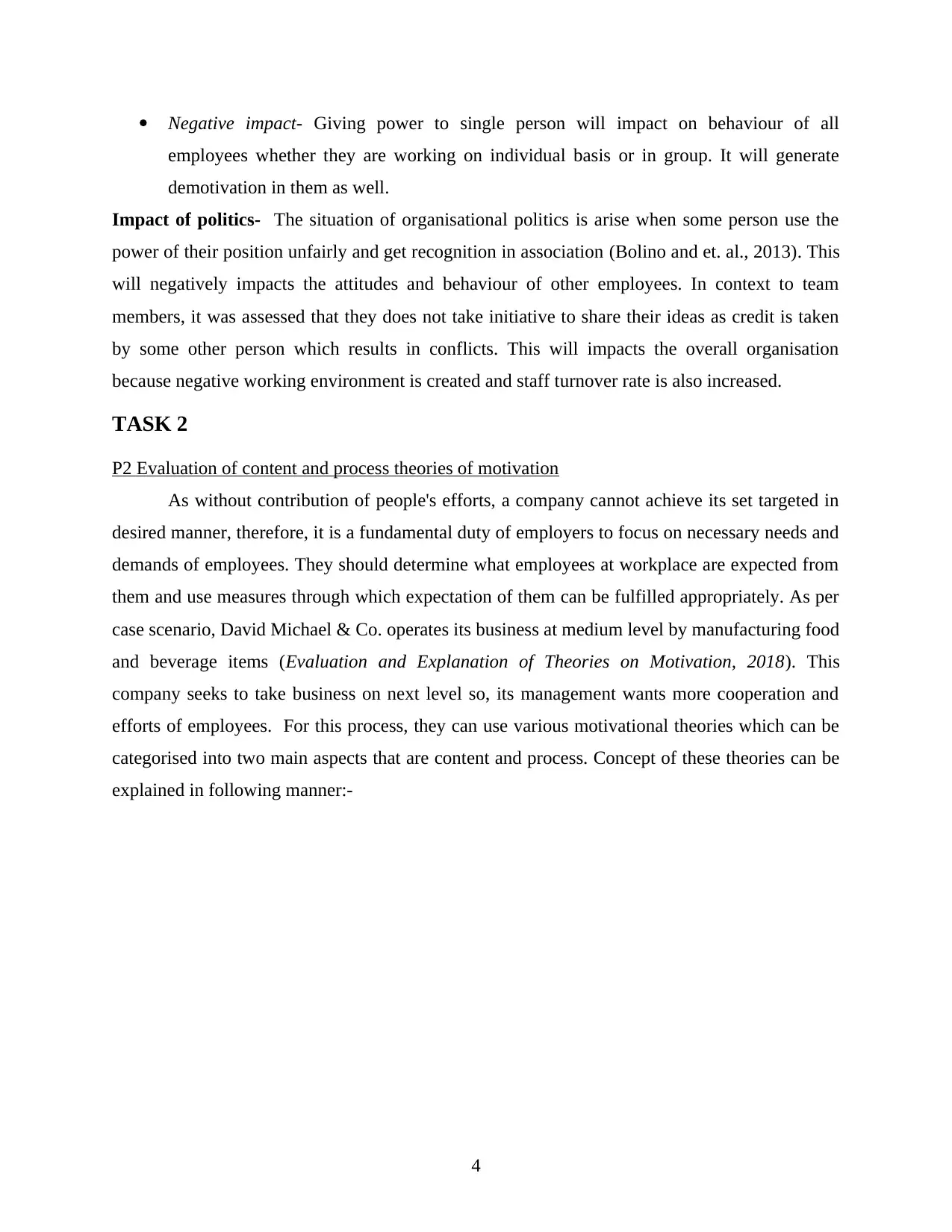
Negative impact- Giving power to single person will impact on behaviour of all
employees whether they are working on individual basis or in group. It will generate
demotivation in them as well.
Impact of politics- The situation of organisational politics is arise when some person use the
power of their position unfairly and get recognition in association (Bolino and et. al., 2013). This
will negatively impacts the attitudes and behaviour of other employees. In context to team
members, it was assessed that they does not take initiative to share their ideas as credit is taken
by some other person which results in conflicts. This will impacts the overall organisation
because negative working environment is created and staff turnover rate is also increased.
TASK 2
P2 Evaluation of content and process theories of motivation
As without contribution of people's efforts, a company cannot achieve its set targeted in
desired manner, therefore, it is a fundamental duty of employers to focus on necessary needs and
demands of employees. They should determine what employees at workplace are expected from
them and use measures through which expectation of them can be fulfilled appropriately. As per
case scenario, David Michael & Co. operates its business at medium level by manufacturing food
and beverage items (Evaluation and Explanation of Theories on Motivation, 2018). This
company seeks to take business on next level so, its management wants more cooperation and
efforts of employees. For this process, they can use various motivational theories which can be
categorised into two main aspects that are content and process. Concept of these theories can be
explained in following manner:-
4
employees whether they are working on individual basis or in group. It will generate
demotivation in them as well.
Impact of politics- The situation of organisational politics is arise when some person use the
power of their position unfairly and get recognition in association (Bolino and et. al., 2013). This
will negatively impacts the attitudes and behaviour of other employees. In context to team
members, it was assessed that they does not take initiative to share their ideas as credit is taken
by some other person which results in conflicts. This will impacts the overall organisation
because negative working environment is created and staff turnover rate is also increased.
TASK 2
P2 Evaluation of content and process theories of motivation
As without contribution of people's efforts, a company cannot achieve its set targeted in
desired manner, therefore, it is a fundamental duty of employers to focus on necessary needs and
demands of employees. They should determine what employees at workplace are expected from
them and use measures through which expectation of them can be fulfilled appropriately. As per
case scenario, David Michael & Co. operates its business at medium level by manufacturing food
and beverage items (Evaluation and Explanation of Theories on Motivation, 2018). This
company seeks to take business on next level so, its management wants more cooperation and
efforts of employees. For this process, they can use various motivational theories which can be
categorised into two main aspects that are content and process. Concept of these theories can be
explained in following manner:-
4
Paraphrase This Document
Need a fresh take? Get an instant paraphrase of this document with our AI Paraphraser
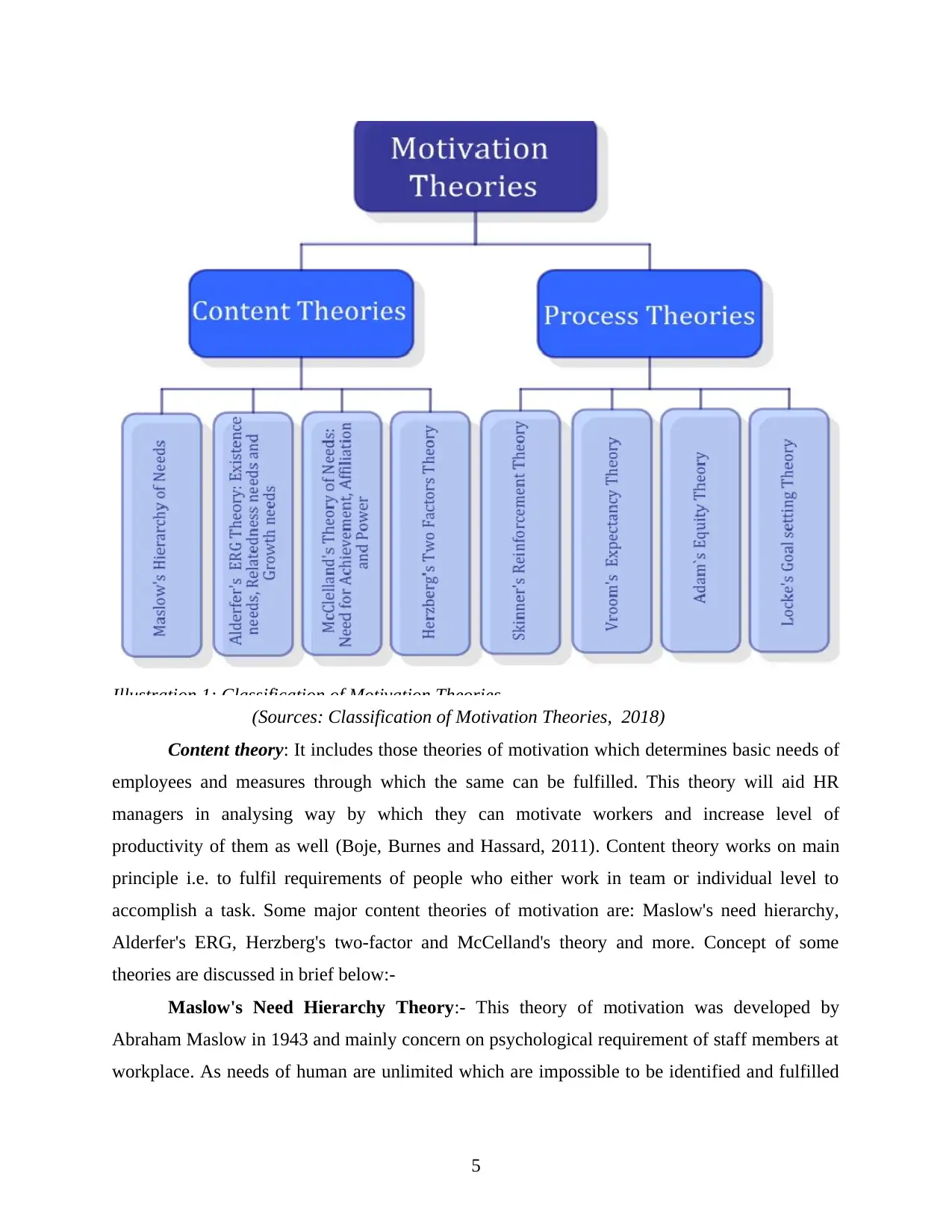
(Sources: Classification of Motivation Theories, 2018)
Content theory: It includes those theories of motivation which determines basic needs of
employees and measures through which the same can be fulfilled. This theory will aid HR
managers in analysing way by which they can motivate workers and increase level of
productivity of them as well (Boje, Burnes and Hassard, 2011). Content theory works on main
principle i.e. to fulfil requirements of people who either work in team or individual level to
accomplish a task. Some major content theories of motivation are: Maslow's need hierarchy,
Alderfer's ERG, Herzberg's two-factor and McCelland's theory and more. Concept of some
theories are discussed in brief below:-
Maslow's Need Hierarchy Theory:- This theory of motivation was developed by
Abraham Maslow in 1943 and mainly concern on psychological requirement of staff members at
workplace. As needs of human are unlimited which are impossible to be identified and fulfilled
5
Illustration 1: Classification of Motivation Theories
Content theory: It includes those theories of motivation which determines basic needs of
employees and measures through which the same can be fulfilled. This theory will aid HR
managers in analysing way by which they can motivate workers and increase level of
productivity of them as well (Boje, Burnes and Hassard, 2011). Content theory works on main
principle i.e. to fulfil requirements of people who either work in team or individual level to
accomplish a task. Some major content theories of motivation are: Maslow's need hierarchy,
Alderfer's ERG, Herzberg's two-factor and McCelland's theory and more. Concept of some
theories are discussed in brief below:-
Maslow's Need Hierarchy Theory:- This theory of motivation was developed by
Abraham Maslow in 1943 and mainly concern on psychological requirement of staff members at
workplace. As needs of human are unlimited which are impossible to be identified and fulfilled
5
Illustration 1: Classification of Motivation Theories
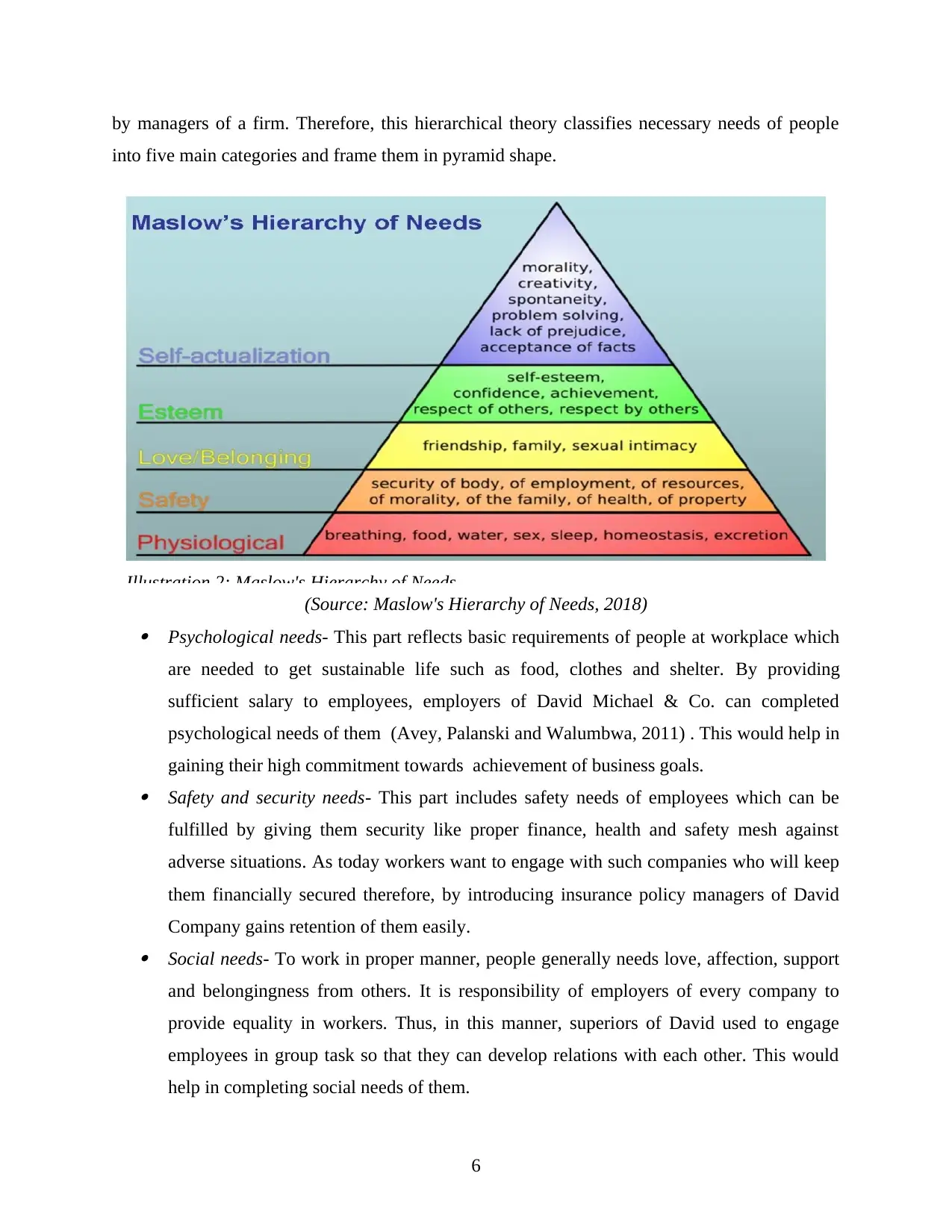
by managers of a firm. Therefore, this hierarchical theory classifies necessary needs of people
into five main categories and frame them in pyramid shape.
(Source: Maslow's Hierarchy of Needs, 2018) Psychological needs- This part reflects basic requirements of people at workplace which
are needed to get sustainable life such as food, clothes and shelter. By providing
sufficient salary to employees, employers of David Michael & Co. can completed
psychological needs of them (Avey, Palanski and Walumbwa, 2011) . This would help in
gaining their high commitment towards achievement of business goals. Safety and security needs- This part includes safety needs of employees which can be
fulfilled by giving them security like proper finance, health and safety mesh against
adverse situations. As today workers want to engage with such companies who will keep
them financially secured therefore, by introducing insurance policy managers of David
Company gains retention of them easily. Social needs- To work in proper manner, people generally needs love, affection, support
and belongingness from others. It is responsibility of employers of every company to
provide equality in workers. Thus, in this manner, superiors of David used to engage
employees in group task so that they can develop relations with each other. This would
help in completing social needs of them.
6
Illustration 2: Maslow's Hierarchy of Needs
into five main categories and frame them in pyramid shape.
(Source: Maslow's Hierarchy of Needs, 2018) Psychological needs- This part reflects basic requirements of people at workplace which
are needed to get sustainable life such as food, clothes and shelter. By providing
sufficient salary to employees, employers of David Michael & Co. can completed
psychological needs of them (Avey, Palanski and Walumbwa, 2011) . This would help in
gaining their high commitment towards achievement of business goals. Safety and security needs- This part includes safety needs of employees which can be
fulfilled by giving them security like proper finance, health and safety mesh against
adverse situations. As today workers want to engage with such companies who will keep
them financially secured therefore, by introducing insurance policy managers of David
Company gains retention of them easily. Social needs- To work in proper manner, people generally needs love, affection, support
and belongingness from others. It is responsibility of employers of every company to
provide equality in workers. Thus, in this manner, superiors of David used to engage
employees in group task so that they can develop relations with each other. This would
help in completing social needs of them.
6
Illustration 2: Maslow's Hierarchy of Needs
⊘ This is a preview!⊘
Do you want full access?
Subscribe today to unlock all pages.

Trusted by 1+ million students worldwide
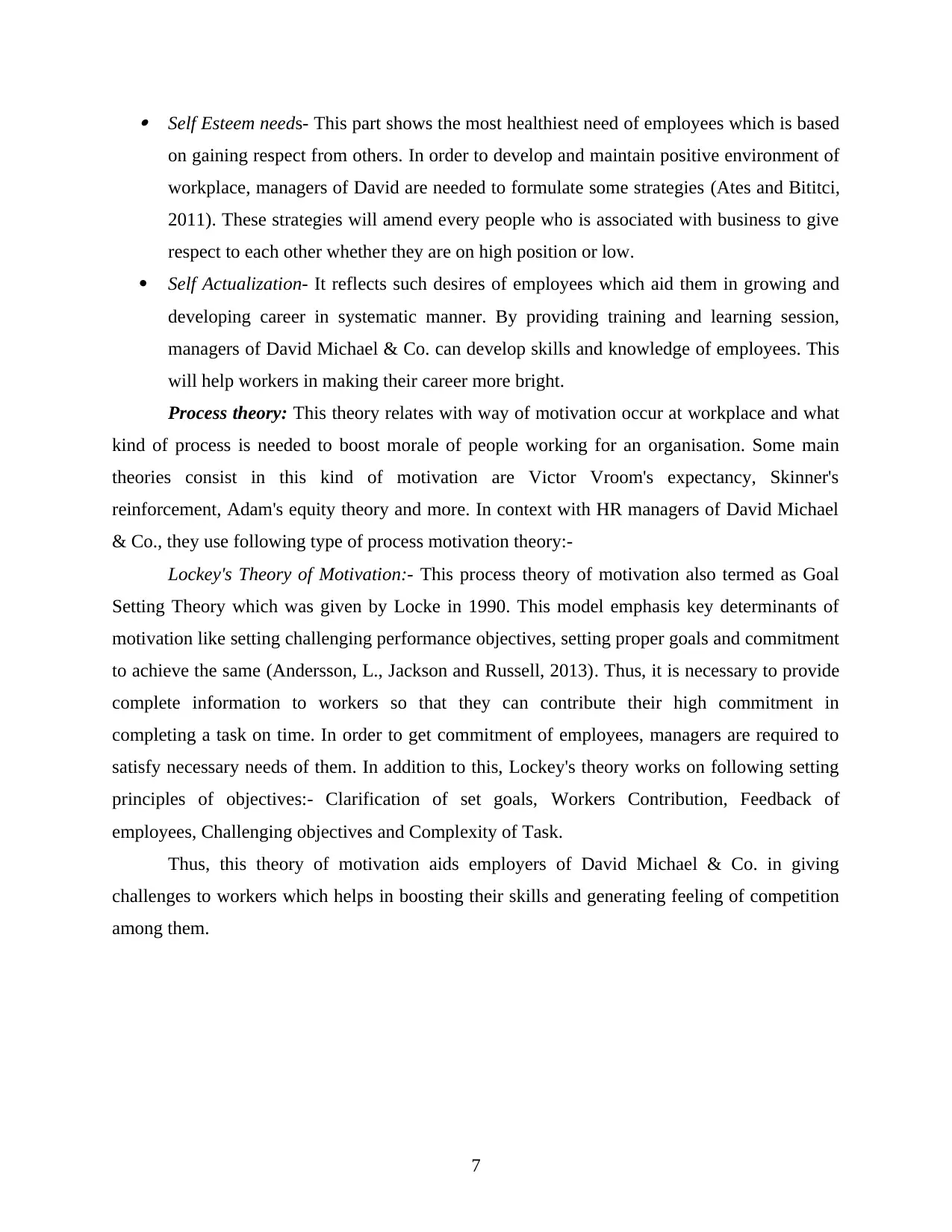
Self Esteem needs- This part shows the most healthiest need of employees which is based
on gaining respect from others. In order to develop and maintain positive environment of
workplace, managers of David are needed to formulate some strategies (Ates and Bititci,
2011). These strategies will amend every people who is associated with business to give
respect to each other whether they are on high position or low.
Self Actualization- It reflects such desires of employees which aid them in growing and
developing career in systematic manner. By providing training and learning session,
managers of David Michael & Co. can develop skills and knowledge of employees. This
will help workers in making their career more bright.
Process theory: This theory relates with way of motivation occur at workplace and what
kind of process is needed to boost morale of people working for an organisation. Some main
theories consist in this kind of motivation are Victor Vroom's expectancy, Skinner's
reinforcement, Adam's equity theory and more. In context with HR managers of David Michael
& Co., they use following type of process motivation theory:-
Lockey's Theory of Motivation:- This process theory of motivation also termed as Goal
Setting Theory which was given by Locke in 1990. This model emphasis key determinants of
motivation like setting challenging performance objectives, setting proper goals and commitment
to achieve the same (Andersson, L., Jackson and Russell, 2013). Thus, it is necessary to provide
complete information to workers so that they can contribute their high commitment in
completing a task on time. In order to get commitment of employees, managers are required to
satisfy necessary needs of them. In addition to this, Lockey's theory works on following setting
principles of objectives:- Clarification of set goals, Workers Contribution, Feedback of
employees, Challenging objectives and Complexity of Task.
Thus, this theory of motivation aids employers of David Michael & Co. in giving
challenges to workers which helps in boosting their skills and generating feeling of competition
among them.
7
on gaining respect from others. In order to develop and maintain positive environment of
workplace, managers of David are needed to formulate some strategies (Ates and Bititci,
2011). These strategies will amend every people who is associated with business to give
respect to each other whether they are on high position or low.
Self Actualization- It reflects such desires of employees which aid them in growing and
developing career in systematic manner. By providing training and learning session,
managers of David Michael & Co. can develop skills and knowledge of employees. This
will help workers in making their career more bright.
Process theory: This theory relates with way of motivation occur at workplace and what
kind of process is needed to boost morale of people working for an organisation. Some main
theories consist in this kind of motivation are Victor Vroom's expectancy, Skinner's
reinforcement, Adam's equity theory and more. In context with HR managers of David Michael
& Co., they use following type of process motivation theory:-
Lockey's Theory of Motivation:- This process theory of motivation also termed as Goal
Setting Theory which was given by Locke in 1990. This model emphasis key determinants of
motivation like setting challenging performance objectives, setting proper goals and commitment
to achieve the same (Andersson, L., Jackson and Russell, 2013). Thus, it is necessary to provide
complete information to workers so that they can contribute their high commitment in
completing a task on time. In order to get commitment of employees, managers are required to
satisfy necessary needs of them. In addition to this, Lockey's theory works on following setting
principles of objectives:- Clarification of set goals, Workers Contribution, Feedback of
employees, Challenging objectives and Complexity of Task.
Thus, this theory of motivation aids employers of David Michael & Co. in giving
challenges to workers which helps in boosting their skills and generating feeling of competition
among them.
7
Paraphrase This Document
Need a fresh take? Get an instant paraphrase of this document with our AI Paraphraser
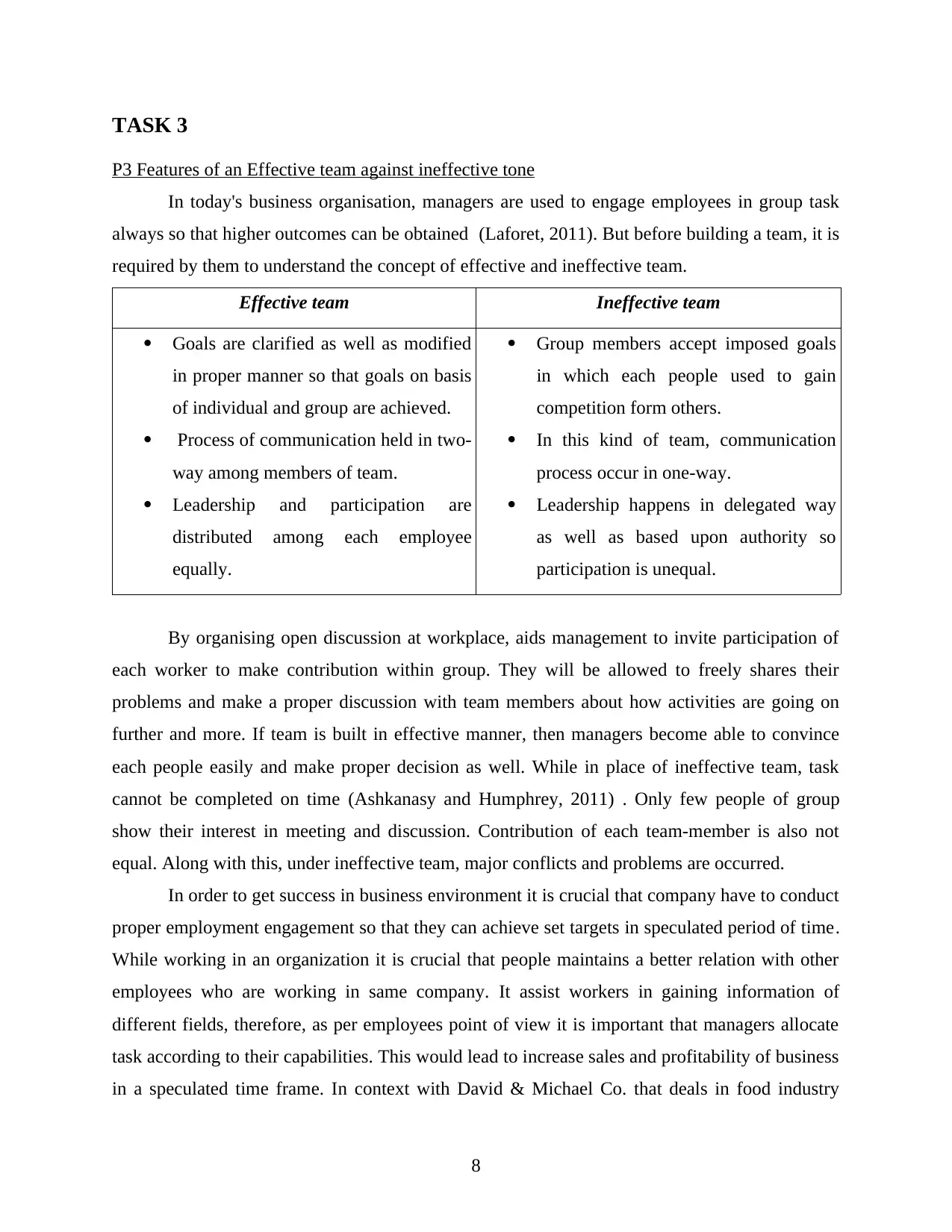
TASK 3
P3 Features of an Effective team against ineffective tone
In today's business organisation, managers are used to engage employees in group task
always so that higher outcomes can be obtained (Laforet, 2011). But before building a team, it is
required by them to understand the concept of effective and ineffective team.
Effective team Ineffective team
Goals are clarified as well as modified
in proper manner so that goals on basis
of individual and group are achieved.
Process of communication held in two-
way among members of team.
Leadership and participation are
distributed among each employee
equally.
Group members accept imposed goals
in which each people used to gain
competition form others.
In this kind of team, communication
process occur in one-way.
Leadership happens in delegated way
as well as based upon authority so
participation is unequal.
By organising open discussion at workplace, aids management to invite participation of
each worker to make contribution within group. They will be allowed to freely shares their
problems and make a proper discussion with team members about how activities are going on
further and more. If team is built in effective manner, then managers become able to convince
each people easily and make proper decision as well. While in place of ineffective team, task
cannot be completed on time (Ashkanasy and Humphrey, 2011) . Only few people of group
show their interest in meeting and discussion. Contribution of each team-member is also not
equal. Along with this, under ineffective team, major conflicts and problems are occurred.
In order to get success in business environment it is crucial that company have to conduct
proper employment engagement so that they can achieve set targets in speculated period of time.
While working in an organization it is crucial that people maintains a better relation with other
employees who are working in same company. It assist workers in gaining information of
different fields, therefore, as per employees point of view it is important that managers allocate
task according to their capabilities. This would lead to increase sales and profitability of business
in a speculated time frame. In context with David & Michael Co. that deals in food industry
8
P3 Features of an Effective team against ineffective tone
In today's business organisation, managers are used to engage employees in group task
always so that higher outcomes can be obtained (Laforet, 2011). But before building a team, it is
required by them to understand the concept of effective and ineffective team.
Effective team Ineffective team
Goals are clarified as well as modified
in proper manner so that goals on basis
of individual and group are achieved.
Process of communication held in two-
way among members of team.
Leadership and participation are
distributed among each employee
equally.
Group members accept imposed goals
in which each people used to gain
competition form others.
In this kind of team, communication
process occur in one-way.
Leadership happens in delegated way
as well as based upon authority so
participation is unequal.
By organising open discussion at workplace, aids management to invite participation of
each worker to make contribution within group. They will be allowed to freely shares their
problems and make a proper discussion with team members about how activities are going on
further and more. If team is built in effective manner, then managers become able to convince
each people easily and make proper decision as well. While in place of ineffective team, task
cannot be completed on time (Ashkanasy and Humphrey, 2011) . Only few people of group
show their interest in meeting and discussion. Contribution of each team-member is also not
equal. Along with this, under ineffective team, major conflicts and problems are occurred.
In order to get success in business environment it is crucial that company have to conduct
proper employment engagement so that they can achieve set targets in speculated period of time.
While working in an organization it is crucial that people maintains a better relation with other
employees who are working in same company. It assist workers in gaining information of
different fields, therefore, as per employees point of view it is important that managers allocate
task according to their capabilities. This would lead to increase sales and profitability of business
in a speculated time frame. In context with David & Michael Co. that deals in food industry
8
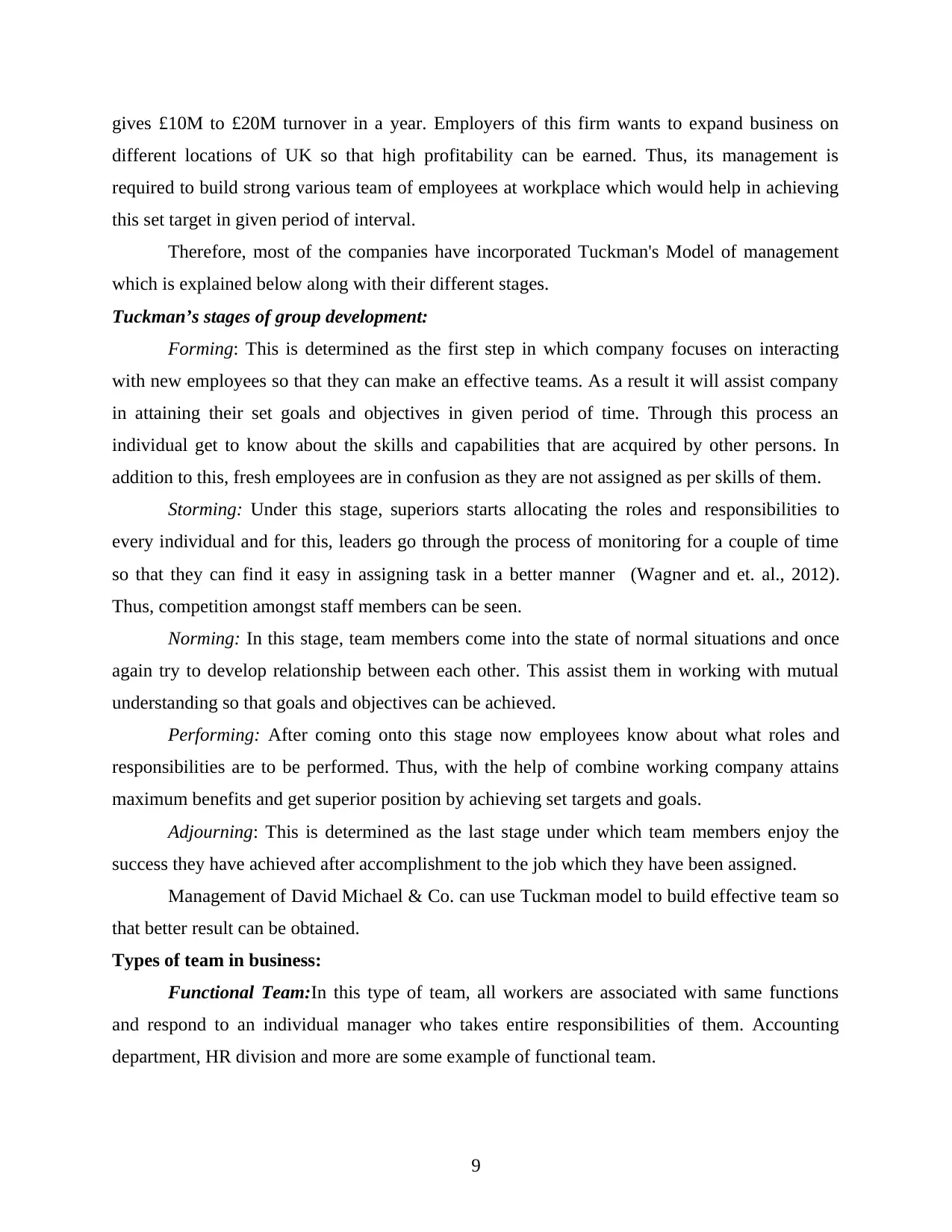
gives £10M to £20M turnover in a year. Employers of this firm wants to expand business on
different locations of UK so that high profitability can be earned. Thus, its management is
required to build strong various team of employees at workplace which would help in achieving
this set target in given period of interval.
Therefore, most of the companies have incorporated Tuckman's Model of management
which is explained below along with their different stages.
Tuckman’s stages of group development:
Forming: This is determined as the first step in which company focuses on interacting
with new employees so that they can make an effective teams. As a result it will assist company
in attaining their set goals and objectives in given period of time. Through this process an
individual get to know about the skills and capabilities that are acquired by other persons. In
addition to this, fresh employees are in confusion as they are not assigned as per skills of them.
Storming: Under this stage, superiors starts allocating the roles and responsibilities to
every individual and for this, leaders go through the process of monitoring for a couple of time
so that they can find it easy in assigning task in a better manner (Wagner and et. al., 2012).
Thus, competition amongst staff members can be seen.
Norming: In this stage, team members come into the state of normal situations and once
again try to develop relationship between each other. This assist them in working with mutual
understanding so that goals and objectives can be achieved.
Performing: After coming onto this stage now employees know about what roles and
responsibilities are to be performed. Thus, with the help of combine working company attains
maximum benefits and get superior position by achieving set targets and goals.
Adjourning: This is determined as the last stage under which team members enjoy the
success they have achieved after accomplishment to the job which they have been assigned.
Management of David Michael & Co. can use Tuckman model to build effective team so
that better result can be obtained.
Types of team in business:
Functional Team:In this type of team, all workers are associated with same functions
and respond to an individual manager who takes entire responsibilities of them. Accounting
department, HR division and more are some example of functional team.
9
different locations of UK so that high profitability can be earned. Thus, its management is
required to build strong various team of employees at workplace which would help in achieving
this set target in given period of interval.
Therefore, most of the companies have incorporated Tuckman's Model of management
which is explained below along with their different stages.
Tuckman’s stages of group development:
Forming: This is determined as the first step in which company focuses on interacting
with new employees so that they can make an effective teams. As a result it will assist company
in attaining their set goals and objectives in given period of time. Through this process an
individual get to know about the skills and capabilities that are acquired by other persons. In
addition to this, fresh employees are in confusion as they are not assigned as per skills of them.
Storming: Under this stage, superiors starts allocating the roles and responsibilities to
every individual and for this, leaders go through the process of monitoring for a couple of time
so that they can find it easy in assigning task in a better manner (Wagner and et. al., 2012).
Thus, competition amongst staff members can be seen.
Norming: In this stage, team members come into the state of normal situations and once
again try to develop relationship between each other. This assist them in working with mutual
understanding so that goals and objectives can be achieved.
Performing: After coming onto this stage now employees know about what roles and
responsibilities are to be performed. Thus, with the help of combine working company attains
maximum benefits and get superior position by achieving set targets and goals.
Adjourning: This is determined as the last stage under which team members enjoy the
success they have achieved after accomplishment to the job which they have been assigned.
Management of David Michael & Co. can use Tuckman model to build effective team so
that better result can be obtained.
Types of team in business:
Functional Team:In this type of team, all workers are associated with same functions
and respond to an individual manager who takes entire responsibilities of them. Accounting
department, HR division and more are some example of functional team.
9
⊘ This is a preview!⊘
Do you want full access?
Subscribe today to unlock all pages.

Trusted by 1+ million students worldwide
1 out of 17
Related Documents
Your All-in-One AI-Powered Toolkit for Academic Success.
+13062052269
info@desklib.com
Available 24*7 on WhatsApp / Email
![[object Object]](/_next/static/media/star-bottom.7253800d.svg)
Unlock your academic potential
Copyright © 2020–2026 A2Z Services. All Rights Reserved. Developed and managed by ZUCOL.





